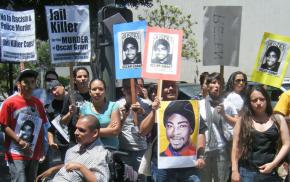Oscar Grant’s killer on trial
reports on the final days in the trial of former BART police officer Johannes Mehserle--and what comes next.
FINAL EVIDENCE was presented in a Los Angeles courtroom on June 29 at the trial of former BART police officer Johannes Mehserle, who shot and killed Oscar Grant III, an unarmed African American passenger, on New Year's Day 2009.
The defense rested its case with the testimony of Thomas Rogers, a forensic pathologist with the Alameda County Coroner's Office, who performed the autopsy on Grant's body. In graphic detail, he described how the bullet entered Oscar's torso and penetrated his left lung.
Rogers testified that the bullet had moved from left to right through Grant's body. Defense attorney Michael Rains claimed that the wounds indicated that Oscar's shoulder was coming up from the platform. Throughout the trial, the defense has argued that Oscar was resisting arrest when he was shot.
Tashina Manyak, a reporter for the CaliforniaBeat.org, wrote that the testimony was emotionally devastating for the family. The father of Grant's friends, Jack Bryson, had walked out of the courtroom. Oscar's mother, Wanda Johnson, "began to sob uncontrollably, prompting Judge Robert Perry to call a short recess. Johnson was later transported to an Los Angeles hospital after collapsing outside the courthouse."

This is the first time a police officer has been tried for murder in California for a killing committed while on duty.
In the early morning hours of New Year's Day, Mehserle and other officers pulled Oscar and his friends off the BART train. After they detained Oscar on the BART platform for several minutes, the officers started handcuffing Oscar and his friends. While officers held Oscar facedown on the ground with his arms behind his back, Mehserle took his pistol out of his holster, pointed it at Oscar's back and fired.
Prosecutors argued that Mehserle intended to shoot Oscar in the back. Defense attorneys maintained that the officer mistook his pistol for a Taser gun and that Oscar resisted arrest. However, the videos that captured the incident are damaging to the defense and its case.
In the videos, Mehserle and his fellow officers come off as aggressive. The footage contradicts the original reports and statements of the officers. In addition, their stories have changed many times in the last 18 months.
Last Friday, Mehserle testified on the stand. In a tearful display, he stated that he "didn't intend to shoot Mr. Grant; I meant to Tase him." He claimed that he shouted, "I'm going to Tase him," when he unholstered his weapon.
When the prosecution asked why none of the video footage picked up his alleged shouting or why he never told anyone it was an accident, Mehserle said he didn't know. Mehserle's close friends and fellow officers testified in court this week that he at no point said the shooting was an accident in the days following the murder.
THE OUTCOME of the trial remains uncertain. There are no African Americans on the jury; seven are white and five are Latino. Over the course of jury selection, the defense dismissed several African Americans.
Members of Grant's family feel that the challenges to potential jurors were based on race. Tracy Cooper, Oscar's aunt, said, "I think [defense attorney] Rains did it because he didn't want one Black mother looking at another Black mother."
Furthermore, three very important pieces of evidence for the prosecution were ruled to be inadmissible.
The first was evidence that one of the officers, Tony Pirone, called Grant a "bitch-ass n-," about a minute before the shooting.
Second was testimony by Oscar's girlfriend, Sophina Mesa, who spoke to him on a cell phone while he was being detained on the platform that night. She could have testified that Oscar sounded nervous and scared shortly before the shooting. Prosecutor David Stein said, "If Mr. Grant was 'nervous' and 'scared' after just being beaten by the police for no reason, it was less likely that he would resist arrest minutes later when he was shot by the defendant."
Lastly, a synchronized compilation of videos of the shooting was barred. The defense argued that it would cause jurors to "incorrectly conclude that both of Grant's hands were behind and in the vicinity of the small of his back at the time the shot was fired." This is exactly what occurred and what is shown clearly in the video evidence.
As the trial comes to a close, the Oakland police department has been preparing for a potential uprising if Mehserle is acquitted. The local media in the East Bay air reports almost every night on how the city and state is preparing for a "violent response."
For almost two weeks, law enforcement agencies have been running drills. Hundreds of officers staged a practice drill near the Port of Oakland. The Oakland police have made several assurances that the department would be working to protect property and local businesses. Police are using anti-Mehserle graffiti around Oakland as an excuse to be aggressive in their preparations for post-verdict activities.
It's impossible to predict the response to the verdict. What's certain is that the killing of Oscar Grant continues to stoke the anger of many youth of color who have experienced racism and police brutality.
During Mehserle's testimony, Timothy Killings, a student at Laney Community College in downtown Oakland, stood up in the court and said, "If you really wanted to cry, you should have apologized to Oscar Grant's mom. You killed her son [and you haven't said anything to her] but you're going to wait until you get on the stand and then start crying?"
The jury could begin its deliberations by Thursday afternoon and could reach a verdict as soon as July 2.


